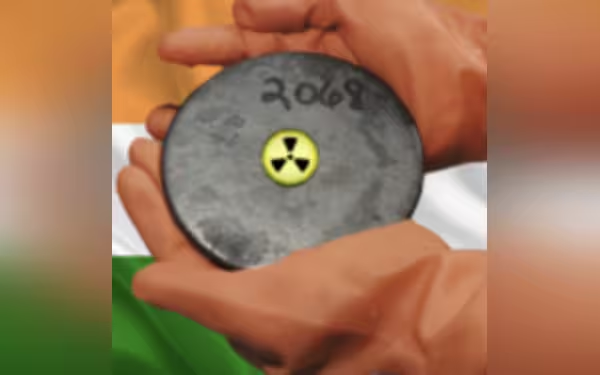Saturday, November 16, 2024 09:21 PM
India's Radioactive Material Crisis
- India faces a growing black market for radioactive materials.
- Recent thefts highlight severe lapses in nuclear security.
- International community's response to India's nuclear issues is inadequate.
 Image Credits: pakistantoday
Image Credits: pakistantodayIndia's nuclear security is under scrutiny as radioactive material thefts rise, raising global concerns about safety and oversight.
In recent years, the issue of nuclear security has gained significant attention, particularly concerning India's handling of radioactive materials. The Nuclear Suppliers Group (NSG) was established in 1974 as a response to India's nuclear weapons test, aiming to prevent the spread of nuclear weapons by regulating the export of nuclear materials and technology. However, the irony lies in the fact that this very group later granted India a waiver, allowing it to pursue its nuclear ambitions without adequate oversight. This has led to alarming developments, including a burgeoning black market for radioactive materials in India, which poses a serious threat to global security.
On August 17, a shocking discovery of radioactive material at Lucknow's Chaudhary Charan Singh International Airport raised concerns worldwide. This incident is not isolated; theft and illegal sales of nuclear materials have become disturbingly common in India. Just days earlier, on August 9, three smugglers were apprehended in Bihar's Gopalganj district with 50 grams of Californium, a rare and highly radioactive substance valued at nearly Indian Rs 8.5 billion. The ongoing forensic evaluations have yet to identify the specific isotopes involved, further emphasizing the inadequacies in India's nuclear oversight.
The presence of Californium, particularly isotopes like Cf-249, Cf-251, and the more dangerous Cf-252, raises serious concerns. These isotopes could potentially be used for catastrophic purposes, and since India joined the Incident and Trafficking Database (ITDB) in 1993, it has reported 27 incidents of nuclear or radioactive materials slipping out of regulatory control. This trend undermines India's claim to be a "responsible nuclear state" and highlights significant flaws in its safety and security systems.
The Nuclear Threat Initiative (NTI), a prominent U.S. non-proliferation watchdog, recently ranked India at the bottom of its "Nuclear Security Index" due to its mishandling of nuclear materials. While these incidents reflect a severe lapse on India's part, the international community's muted response, particularly from the United States, is equally troubling. Californium is not naturally occurring; it is produced in limited quantities at only two facilities worldwide: the Oak Ridge National Laboratory in the USA and the Research Institute of Atomic Reactors in Dimitrovgrad, Russia. The potential for this substance to be used in radiological terrorism, especially Cf-252, which can be utilized to create dirty bombs, is a grave concern.
If the trend of radioactive material theft continues unchecked, it could lead to catastrophic consequences. India's history of blaming Pakistan for various issues raises the possibility that it might scapegoat its neighbor in the event of a radiological attack. The West has often sided with India in matters of nuclear safety, failing to address the serious concerns surrounding its nuclear security and human rights issues in Indian-Occupied Kashmir.
Recent reports suggest that Indian non-state actors have gained access to Californium, highlighting the severe shortcomings in India's nuclear security infrastructure. The question is no longer whether these groups will deploy such materials, but when and with what devastating consequences. The acquisition of Californium by rogue elements signals a potential preparation for an unprecedented act of radiological terrorism.
In light of these developments, it is crucial for the NSG countries to reconsider India's waiver status due to its lapses in nuclear security. India is a party to both the Convention on the Physical Protection of Nuclear Material (CPPNM) and UNSC Resolution 1540, which aim to enhance global security by preventing nuclear proliferation. However, its irresponsible behavior threatens to undermine these commitments and weaken the broader non-proliferation regimes.
As the world grapples with the implications of nuclear security, it is essential for major powers to prioritize the safety and well-being of billions of people over political interests. The stakes are high, and the potential consequences of inaction could be catastrophic. It is imperative that the international community takes decisive action to address these pressing issues before it is too late.













